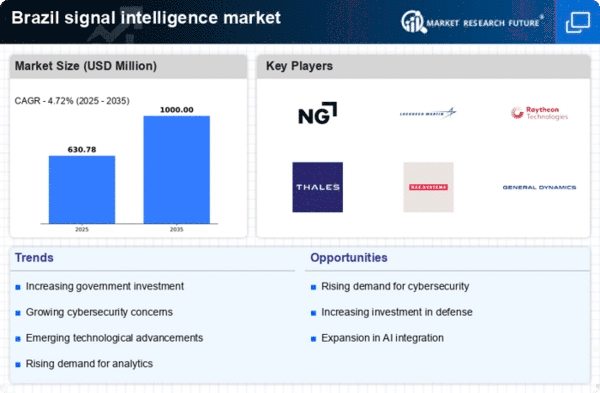Rising Cybersecurity Threats
The escalating cybersecurity threats in Brazil are a major catalyst for the signal intelligence market. As cyberattacks become more sophisticated, organizations across various sectors are recognizing the need for robust intelligence solutions to safeguard their data and infrastructure. In 2025, it is estimated that cybercrime will cost Brazilian businesses over $10 billion, prompting a surge in demand for signal intelligence technologies that can detect and mitigate these threats. Companies are increasingly investing in signal intelligence systems to monitor network traffic and identify potential vulnerabilities. This heightened awareness of cybersecurity risks is likely to drive the signal intelligence market, as organizations seek to enhance their defensive capabilities against cyber threats. The market is expected to grow at a CAGR of around 12% as businesses prioritize investments in advanced signal intelligence solutions.
Technological Integration in Defense Systems
The integration of advanced technologies into defense systems is a pivotal driver for the signal intelligence market in Brazil. The Brazilian military is increasingly adopting cutting-edge technologies such as artificial intelligence, machine learning, and big data analytics to enhance its intelligence capabilities. This trend is evident in the recent procurement of advanced signal intelligence systems that can process vast amounts of data in real-time. The Brazilian defense budget for 2025 includes a significant allocation for technological upgrades. This amount is approximately $2 billion. This investment is expected to facilitate the development of more sophisticated signal intelligence solutions, thereby propelling market growth. As the military seeks to modernize its operations, the signal intelligence market is poised to benefit from these technological advancements, which are likely to improve operational efficiency and effectiveness.
Growing Demand for National Security Solutions
The increasing focus on national security in Brazil is driving the signal intelligence market. With rising concerns over terrorism, cyber threats, and organized crime, the government is investing heavily in advanced surveillance and intelligence-gathering technologies. In 2025, The Brazilian government allocated approximately $1.5 billion to enhance its intelligence capabilities. This investment is expected to boost the signal intelligence market significantly. This investment reflects a broader trend where national security agencies are prioritizing the acquisition of sophisticated signal intelligence systems to monitor and analyze communications. As a result, the signal intelligence market is expected to experience robust growth, with an anticipated CAGR of around 10% over the next five years. This demand for enhanced security solutions is a key driver for the signal intelligence market in Brazil.
Collaboration Between Public and Private Sectors
The collaboration between public and private sectors in Brazil is emerging as a crucial driver for the signal intelligence market. Government agencies are increasingly partnering with private companies to leverage their expertise in technology and innovation. This trend is evident in various initiatives aimed at enhancing national security and intelligence capabilities. In 2025, several public-private partnerships are expected to be established, focusing on the development of advanced signal intelligence systems. These collaborations are likely to result in the sharing of resources and knowledge, fostering innovation within the market. As a result, the signal intelligence market is anticipated to benefit from increased investment and the introduction of cutting-edge technologies, which could enhance the overall effectiveness of intelligence operations in Brazil.
Increased Investment in Telecommunications Infrastructure
The expansion of telecommunications infrastructure in Brazil is significantly impacting the signal intelligence market. With the rollout of 5G technology, there is a growing need for advanced signal intelligence systems that can effectively manage and analyze the vast amounts of data generated by these networks. The Brazilian government has committed to investing approximately $3 billion in telecommunications infrastructure by 2026, which is expected to create new opportunities for signal intelligence providers. This investment will not only enhance connectivity but also facilitate the deployment of advanced surveillance and monitoring systems. As telecommunications networks evolve, the signal intelligence market is likely to experience substantial growth, driven by the demand for solutions that can operate effectively within these advanced frameworks.
















